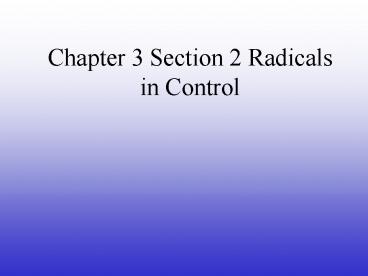Chapter 3 Section 2 Radicals in Control
1 / 14
Title:
Chapter 3 Section 2 Radicals in Control
Description:
Chapter 3 Section 2 Radicals in Control By early 1866, Southern states had passed black codes, or laws to control freed men and women. The black codes trampled the ... –
Number of Views:77
Avg rating:3.0/5.0
Title: Chapter 3 Section 2 Radicals in Control
1
Chapter 3 Section 2 Radicals in Control
2
By early 1866, Southern states had passed black
codes, or laws to control freed men and women.
The black codes trampled the rights of African
Americans.
3
To freed men and women and many Northerners the
black codes resembled slavery.
4
Congress then passed the Civil Rights Act of
1866. This act granted full citizenship to
African Americans and gave the federal government
the power to intervene in State affairs to
protect their rights.
5
It also contradicted the 1857 Dred Scott decision
of the Supreme Court, which had ruled that
African Americans were not citizens.
6
President Johnson vetoed the bill. He argued that
the federal government was overstepping its
authority.
7
Republicans in Congress had enough votes to
override, or defeat, the veto and the bill became
law. This marked the end of a good relationship
between the president and congress.
8
In 1866 Congress passed the 14th Amendment to the
Constitution. It was enacted in 1868- it
guaranteed full citizenship to all people born in
the United States.
9
The Fourteenth Amendment also excluded Native
Americans from citizenship.
10
Congress passed a series of laws to limit the
presidents power, such as the Tenure of office
Act. It prohibited the president from removing
government officials, including members of his
own cabinet without the Senates approval.
11
In August of 1867 Johnson suspended Secretary of
War Edwin Stanton without the Senates approval.
12
Outraged by Johnsons actions, the House of
Representatives voted to impeach the president.
The Senators however failed to achieve the 2/3
majority required for conviction.
13
Ulysses S. Grant was elected president in 1868-
Grant received most of the African American votes
in the South and won the presidency.
14
In 1870 the 15th amendment was passed- it
prohibited the state and federal governments from
denying the right to vote to any male citizen
because of race, color, or previous condition of
servitude End































